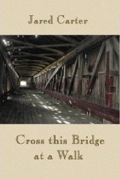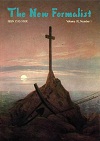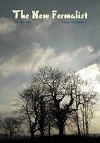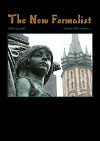Purchase
Now, as both owners’ and their slaves'
descendents and mixed heirs,
we waltz our souls on tops of graves
undaunted by their cares.
We dress as young as Innocence,
and, under Institutions’ name,
have lazy brother Ignorance
absolve our selves from facts, and blame.
The frock they bear, impervious,
cloaks us from visibility
while we go on a shopping spree
and Chinese children slave for us
on a far-off assembly line
to make us two for ninety-nine.
Mother
You can almost see it in the lines across her face:
Her heart’s been rent so often that I guess her mind’s unsound,
What with no mere brood of children but the onset of a race
Whom she can't stop from wreaking havoc all around the place
(The Father being nowhere to be found).
Last week she had to let a little fire out with the steam;
The next day she exploded in a sudden, wicked storm;
Then yesterday, was pent up in a rage and split a seam,
The image of her children still reminding her of Him.
She’s calm now (though for winter, it seems warm).
Will her children heed her temper? Will we listen by tomorrow?
Will her Love, their Father, come back in Time, as planned?
Will she drown in her tears, an ocean rising with her sorrow,
Or just explode (which I would understand)?
Structure
The Roman arch seems supported by air
and carries water, wagons, and upper stories
even to this day. While some have crumbled
particularly as the late empire was humbled
Italy is yet filled with ample glories
of surviving structures almost everywhere.
The Indian arrow—feathered at one end
with the other pointed—scudded through the air.
When you walk in the woods in New England,
you can still find flints, sometimes stained with blood,
though not the feathers, or the shafts of whittled wood.
And you know that all were designed and honed with care
to do something, to go somewhere, to bring
through storms and times, beyond a wilderness,
a trace of whoever made some things—something.
Their fallen stones meant more than to express
and since their flight have managed to withstand.
I am Italian and American,
Irish, too, and German—actually Prussian—
each part contributing something: the Italian, song;
the Irish, if not the mystical then verboseness;
the Prussian, a need to keep busy, the need relentless;
the American, a desire to get along.
And so my cells already had a history
before their notion of assembling into me
as a bridge to carry something, a tissue
or network of tissues, or arrow to be flung
as text to be read or recited, song to be sung,
ordered expressiveness to present to you. . . .
And words and notes have been my wood and stone,
subjected to discipline as I’ve tried to hone
them in the hope a missile graze a cheek
or reach a heart that, flinching, feels me there:
or else some later age’s woman or man
might come upon it when we’re both long gone
and rub its side for the solace they might seek,
or pocket it while on a jaunt somewhere
so they might simply know that I was near,
and some of me remains, and it is here:
in their pocket, the words, the notes, and in the air.
Better
Better a wail should burst and be misread
as fury in the swelling of an urge
than overhear, “I thought that he was dead.”
Better to lay a life along a verge
than in the ground, to holler in a crowd,
I am I want I’m here and love—love you—
unwisely long, embarrassingly loud.
Better especially if it is true.
Better to undertake a dream and burn
from failure, leaving ash for others’ raking
into a shelved commemorative urn,
than suit it for another’s undertaking.
Better to fright the world with bolts of thunder
by popping pent-up thunderheads within.
Better than understanding’s standing under
and in—albeit in danger, or in sin—
to bellow and be reckoned, risk and blunder—
even if reputation’s ripped asunder
instead of made. That would be better than
no name at all. But how do I begin?
Better if you show me how you began.
Solution
With potent potions
shake well
then take.
With potent notions
take well
then shake
perhaps, that is, when they’re
their best
and if you
swallow properly
not mixing in too
much air.
To see
if you do
there’s a test:
they should be
easy
to take, not to
digest.



